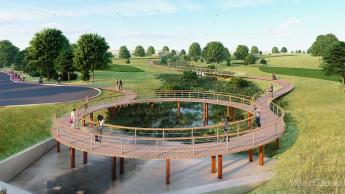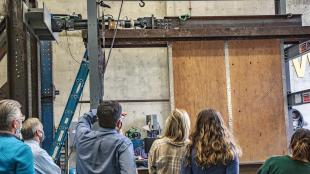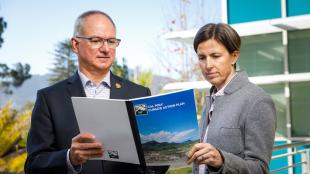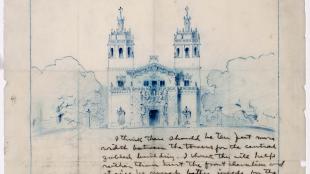How a Team of Landscape Architecture Students Created a Big, Beautiful, and Interactive Website for Their Senior Projects

One of the overarching themes (or tropes) of the global response to the pandemic has been a widespread examination of how we adapt work, social engagements, and other aspects of our lives that normally occur in physical spaces to distanced or digital settings. It’s no surprise therefore that students who study the built environment in the CAED’s Landscape Architecture Department—and carefully consider how users experience it—were similarly occupied last year, when they began planning the showcase for their senior projects. What is surprising is how well they adapted to a format that’s usually more the purview of graphic and digital media professionals: a big, beautiful, functional website, loaded with fascinating, highly visual, and interactive content.
“Typically the graduating seniors have a gallery event, presenting their thesis and the projects they’ve been working on for their fifth year,” says recently graduated landscape architecture alumnus Timothy Gobel, a member of the presentation planning committee. “This is all normally student organized, so a bunch of us generally come together to plan and install this gallery and set a theme and secure venues and fundraising.”
“Unfortunately,” says Sarah Haluschak, who is also a recent landscape architecture graduate and served on the committee with Gobel, “we knew with commencement being cancelled the previous year that wasn’t going to be an opportunity. So we really just wanted create something that felt like a celebration for our classmates who were graduating and to provide them with as many opportunities as possible showcase their senior projects.”
The result became a study in what can be achieved when individuals with high visual and spatial literacy and an awareness of user experience collaborate on a project. Organized into series of galleries and individual pages, the website that Gobel and Haluschak created features synopses of each graduate’s project, replete with concept renderings, site analyses, embedded videos and photo galleries, and even landing pages with clickable, Vogue-magazine-style cover designs and portraits. Just the raw collection of the visual and text assets—much less the digital build itself—represents an impressive achievement, especially considering the sheer volume of content that Gobel and Haluschak were charged with collecting from other busy students, plus the fact that everyone involved was also working to complete their courses and their own senior projects.
“It was definitely a little tricky,” says Gobel. “I mean Sarah and I were both trying to catch up on our own submissions, and a lot of people were submitting late because that’s just the nature of working on a huge, cumulative project.”
Since its launch and rollout, the site has been used by graduates as everything from a companion piece to their end-of-year virtual presentations to a portfolio tool while contacting potential employers. And even with the return to in-person events and learning this fall, a conversation has developed within the department about how to keep it alive, as a continually updated digital hub for subsequent graduating classes. Gobel has been meeting with the current senior project presentation planning committee to discuss workflows, content gathering, and general site maintenance and management.
Meanwhile, Beverly Bass, head of the Landscape Architecture Department, has been making sure to share it with interested parties—from prospective students, to potential donors, to members of the American Society of Landscape Architects—to showcase the work coming out of the department. “A project like this might have been designed to highlight our students’ work as landscape architects,” says Bass, “but it also shows how they can learn to be graphic designers, or website builders, or employ their Cal Poly educations to solve problems. I’m finding it’s a tool for a lot of interactions that help the department, beyond what I think it was intended for. This is a good example of something that we probably wouldn’t have created without the pandemic. Now that it’s done, though, we have a precedent and an asset that will continue into the future.”
“One of the things I still appreciate about it is how it’s a place where you can visit and remember all the work we created that year,” says Haluschak. “It’s like a time capsule to help us all stay connected.”
“It was difficult, at least for me, to leave studio so abruptly when the pandemic began,” adds Gobel. “We really didn’t see many of our classmates until graduation, so we’re hoping this website provides a good send off and a way to reconcile with those emotions and that lack of closure.”




